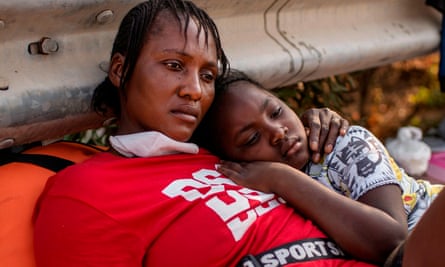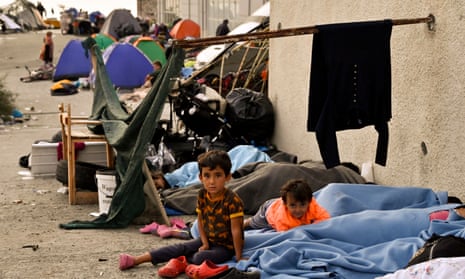A fire rips through a refugee camp. Migrants are blamed for starting it. Outraged locals vent their fury and demand that the migrants be removed.
That’s what happened last week at the Moria camp on the Greek island of Lesbos. It is also what happened almost a year ago. Then, tragically, a woman died. This time, there have, thankfully, been no deaths, but the camp has been completely destroyed. The claims last year that migrants had attacked firemen were false – it was, in fact, migrants who first tackled the blaze. This time, there is confusion as to how the fires began – some blame migrants angry at being quarantined after testing positive for Covid-19, others point the finger at hostile outsiders.
The question of who started the conflagration is, however, as the investigative journalist and researcher Daniel Howden notes, a bit like asking “why a matchbox caught fire”. A better question, he suggests, is: “How did this firetrap not burn down sooner?”
Built in 2015 to deal with the large influx of migrants who came to Europe from Turkey that year, Moria was designed to accommodate 3,000 people. By the time of the fire last week more than four times as many lived there, in flimsy tents amid the foulness of streams of sewage and with little access to electricity or clean water. Every visitor to the camp echoed each other’s words – “shameful”, “shocking” , a “disgrace”, the “moral failure of Europe”.
The irony of Moria is that, while the overcrowding and squalor set in almost from the start, the real problems began not when the people first arrived but when the EU signed a deal with Turkey in 2016 to limit their numbers.
Fewer migrants arrived on Lesbos, but they were now imprisoned on the island, barred from travelling to the mainland, let alone beyond. The scheme to relocate people to other EU member states was a disastrous failure.
The problem of Moria was not simply a lack of resources. The EU has thrown millions of euros at the migrant crisis. Moria was so dehumanising because, in Howden’s words, it was an “anti-shelter”, designed to act as “a spectacle… to deter future asylum seekers”.

The former mayor of Lesbos Spyros Galinos agrees. The chaos and degradation of Moria, he observed three years ago, seemed to have been deliberately engineered by officials in Athens and Brussels to send a message to potential new migrants that “the path across the Aegean isn’t worth it”. If the Moria camp were to bear a message, the journalist Rachel Donadio observed, it would be: “Welcome to Europe. Now go home.”
“Deterrence” has become the watchword of immigration policy around the world. From Australia to South Africa to America to Europe, the aim is to make conditions for undocumented migrants so unbearable that no more will want to come. It’s why the EU has spent millions recruiting armies, militias and criminal gangs across North Africa and the Middle East to capture and incarcerate would-be migrants in the most degrading of conditions. It’s why Greece has apparently taken to expelling them by abandoning them at sea. It’s why camps such as Moria exist.

The evidence suggests that policies of deterrence do little to deter people. But politicians have become so wedded to the belief that demonstrating any kind of humanity can only be a “pull factor” that their primary aim has been to think of how to make the lives of undocumented migrants as miserable as possible.
It is a policy that has created not only torment for migrants but misery for locals too. Despite the large numbers who arrived on the island in 2015 and 2016, people on Lesbos welcomed them with food, shelter and solidarity. The squalor and humiliation designed into Moria has, however, inevitably spilled over into the island too. Hundreds of migrants are compelled to live in olive groves or on the streets. The violence, the inevitable consequence of forcing so many people into such distressing conditions, has spilled over too. So has crime. The result, Galinos observed, was that “kindness turned to anger”.
Politicians often defend Europe’s hardline policies on the grounds of public hostility to immigration. But that hostility is at least partly shaped by those very policies, “solutions” that normalise inhumanity and pit migrants against locals.
In 2015, the German chancellor, Angela Merkel, was fiercely condemned for courting disaster after opening Germany’s borders to hundreds of thousands of migrants, a policy from which she herself retreated. Five years on, her more humanitarian instincts have largely been vindicated. It is the policies of “Fortress Europe” that have brought disaster.

